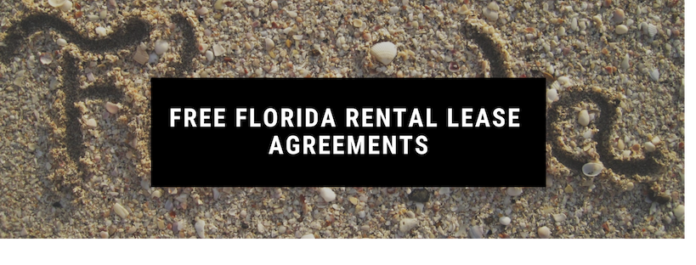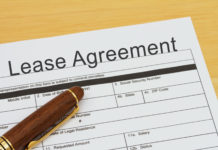While the rest of the nation showed a stagnant or decline in rental rates, Florida has boasted a growth across the state. Most cities average a rent growth rate of 4%, but some standout cities are Orlando and St. Petersburg. They are putting up growth rates of 6.1% and 9.2% respectively.
Free Florida Rental Lease Agreement
Not sure where to find one? We have a few resources and tips to help you start making money in this booming rental market.
The Florida Bar Website
One of the best resources you have at your disposal is the Florida Bar website. There you can find forms in PDF form that have been approved by the Florida Supreme Court.
This is an advantage to you because you can be more confident that your agreement will comply with the law and be accepted by the court. The only caveat is that the law is always changing, so you’ll want to check and make sure that the forms are up to date with the most current law.
Also, note that the forms provided by the Florida bar are for lease that will not exceed one year.
Municipal Websites
You can check with your local jurisdiction to see if the local government provides a lease agreement template. The Miami Dade website offers a basic lease template that can provide a quality starting point for your lease agreement.
Government Agency Website
Some state government websites will offer basic lease agreement templates. There’s this one from the Department of Management Services.
If you are looking for a lease agreement template that gives you the option for changing monthly payments, this one will work well. You can specifically outline when and how much a tenant is required to pay throughout the lease term.
Landlordo
Did you know that you are already in the right place to find a free rental agreement? The best part, the template is in Word.
This makes it much easier to download, open, and start filling out. Often, when you try to fill out a PDF you can’t. This means you’ll have to print it out, fill it out by hand, and then scan it back into your computer.
The problem with this is the extra work and steps required. Plus handwriting is never as neat or as clear as typing. You don’t want there to be any chance of confusing, so typing out the terms is the best option.
Commercial Lease
A great standout of this website is that it also provides commercial lease agreement templates. The other resources on this list do not.
This is mainly because the other resources assume that you will hire an attorney for a commercial lease. This isn’t always possible though.
If you own commercial property that you would like to rent out, you will need a different lease than one used for a residential property. You also need to keep in mind that Florida has different laws that govern commercial property landlords.
You will need to check your commercial lease to ensure that you are following the correct set of laws.
What Type of Form Do You Need?
One thing you will notice with the resources we have provided is that they offer more than one type of lease agreement. That is because the Florida law is different depending on the type of property you are leasing out.
For example, the Florida Bar website has two different lease forms available. There is one for those looking to lease a single family home or a duplex. Then there is another form for those looking to lease a multi-family home, mobile home, condo, or cooperative.
Check Your Form
Before you download and start using a lease form, make sure that it has these elements. The more detailed and thorough your lease agreement is, the less likely you are to have disputes later on. If there is a dispute, it can be resolved quickly by having all the terms outlined in your lease.
Amount of Rent
There should be a place to put the exact dollar amount. This is the total amount of money that the tenant can expect to pay.
When the Rent Is Due
Most residential leases require the rent to be paid monthly. If you decide to follow this trend then you need to pick a day in which the amount you listed in the last step is due.
For ease of accounting, most landlords will say the rent is due on the first. Then they will include a provision in the agreement to pro-rate the rent for the first month that the tenant moves in if the move in date isn’t on the first.
Length of Tenancy
The lease agreement needs to state how long the agreement will run for. So are you leasing the home for one year? If so then you need to fill in the date from one year from the start date.
There should also be a provision to what happens after the lease expires. Usually, a lease will turn into a month to month agreement once the initial term is completed.
Forms of Payment Accepted
You need to put what type of payment you are willing to accept. There should be at least two options.
Do not put that you are willing to accept cash. This is not traceable and will only invite confusion and disagreement.
Where to Pay the Rent
The agreement needs to spell out how the tenant should send you, the landlord, the rent payment. Here you can put that you will stop by, or the tenant must bring it someone, or that mailing it is acceptable.
Grace Periods
Your lease form must state whether or not you are willing to give your tenant a grace period for the rent payment. This is a period of time after the rent becomes due that the tenant won’t be penalized for paying late.
You could fill in that the tenant has 5 days after the rent due date. During this time the tenant’s payment will not be considered late.
Late Fees
Finally, you need your lease form to include whether or not you will assess late fees. This is additional money you will charge your tenant for not making their rent paid by the due date or within the grace period.
What If Your Form Is Lacking
Under Florida law, if your lease agreement is missing information, the state law will apply some standard terms. This is the court’s way of “filling in the blanks” for agreements that may not be complete.
Rent Due Date
If you do not specify a specific due date for the rent, the state will say that the rent is due at the beginning of each rent period. You do not have to make a demand for the rent to be due.
Length of Tenancy
If you do not state how long the lease term is for, the state will assume the length based on when the rent is due. So if your tenant pays weekly, then you have a weekly tenant.
If the tenant pays you monthly, then you have a month to month lease. This continues on for both quarterly and yearly rent payments.
Items You Can’t Include
Be on the lookout for these items in the lease agreement form you choose. These are items that you cannot include in a lease and may render your lease unenforceable.
Maintenance and Repairs
Your lease agreement template cannot include a provision that requires the tenant to pay for repairs to the property. As the owner of the residential property, you are required to handle all maintenance.
You can, however, include a point that the tenant is responsible for the damage they cause. This would be if they smash a window or put a huge hole in the wall.
Right to Privacy
As the landlord, you must give a minimum of 24 hours’ notice to the tenant when you plan to enter the property. If it’s an emergency this can be waived, but the tenant is the only one who can waive it.
Security Deposit
You cannot make the security deposit nonrefundable. There also may be a maximum amount you can request for a security deposit.
Equal Tenant Rights
Think carefully when creating your first rental agreement. All of your tenants on that property must be given the same rights and treated equally.
Right to Sue
You cannot force your tenant to waive their right to sue you. Sure, the lease agreement can help avoid going to court, but ultimately, you cannot have the tenant waive their right to legal recourse.
Create Your Lease Agreement
Whatever lease agreement form you decide to use, make sure that it contains all of the terms as required by Florida law. Even if terms aren’t required by law, it is always better to have more and be more specific.
When your lease contains specific provisions, you are less likely to need to go to court to settle a dispute. This will save you time and money.




















